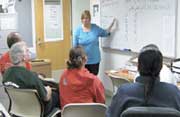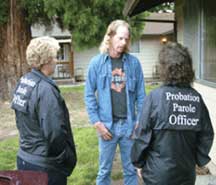 |
Previous Issues |
| Cedar Mill Community Website |
|
| Search the Cedar Mill News: | About The Cedar Mill News |
|
|||||||
| Volume 8, Issue 3 | March 2010 |
||||||
Powers that be
|
 |
| The WCCC Center in Hillsboro |
In my attempt to understand the system, I discovered a relatively quiet institution in Washington County—the Community Corrections Department, which is tasked with preparing people who have been incarcerated to lead more productive lives back in regular society. No other segment of our prison-industrial complex does this as well, as I learned when, for six months in 1993, I volunteered at the Washington County Community Corrections Center (WCCCC—also known as the “Restitution Center” and?“Work Release Center.”
Under the guidance of Director John Hartner, the Community Corrections department was implementing a new approach to treatment in the corrections setting, striving to create an effective program which allowed the clients to understand the impact of their crimes on others and to make meaningful strides in changing the behaviors that landed them in trouble in the first place. Mr. Hartner was creating a system that challenged the core assumptions of the residents.
The mission of the Community Corrections Department is to “Provide adult corrections services in Washington County that enhance public safety by reducing criminal behavior by offenders.” The department provides a continuum of supervision, sanctions, and services that reduces criminal conduct and promotes behavioral change with the lowest necessary investment of resources. To meet this challenge, the Department provides the following facilities and services:
The Washington County Community Corrections Center (WCCCC) offers 215 beds for male and female offenders. The WCCCC provides a structured residential environment to integrate offenders back into the community. The residents are offered transition support through services, structure, and accountability. Support services include employment, housing, education, counseling, and a variety of life-skills programs. Program services are provided to address the needs that put offenders at risk to re-offend. These programs include both in-patient and out-patient substance abuse treatment, acupuncture, mental health evaluation and treatment, GED, employment counseling and job referrals, cognitive skills training, faith-based support, and life-skills programs such as computer skills, resume writing and parenting. This treatment program was evaluated with the national Correction Program Assessment Inventory and ranks in the top 8% nationwide for compliance with evidence based practices.
The following populations are served through the Center and/or custodial home supervision:
Sentenced: Offenders are sentenced directly to the Center or Custodial Home Supervision or serve out the balance of a sentence that started at the jail. Sentenced offenders currently occupy approximately 60% of Center beds.
Sanctioned: Center beds and Custodial Home Supervision slots are used for short-term sanctions for probation and post-prison supervision offenders. They offer probation/parole officers a quick response to non-compliance, within a structured setting that provides programs to address problem behaviors. Sanctioned offenders currently occupy approximately 5% of Center beds.
Local Control (SB 1145): This population includes those offenders who are serving twelve months or less for a felony conviction or revocation of felony probation. This group also includes parole and post-prison supervision offenders serving a sanction of 31-90 days and offenders who have been revoked on post-prison supervision serving a sanction up to 180 days. Local control currently occupies approximately 27% of center beds.
Transitional Lodgers: The Center’s goal is to manage the transitional lodger population to 12 beds, with the flexibility to use up to 15 beds. This program works with high-risk, homeless offenders transitioning from prisons; the mentally ill; and sex offenders until alternative housing is located. Lodgers must agree to abide by supervision conditions and Center rules to remain in the program. They must work, or actively pursue it, while seeking other housing. They must also participate in programs at the Center that can facilitate their transition back into the community.
 |
| Job skills training at the WCCC |
Residential Counselors work with residents to develop an individualized case plan for services that will promote a constructive stay at the WCCCC and facilitate a successful transition back into the community. Community Corrections Specialists have primary responsibility for ensuring the safety and security of the facility. Through direct supervision they monitor and ensure the WCCCC policies are upheld. A drug screen protocol is developed for each resident that is based on the offender’s history and recent behavior. Security is further enhanced by the design of the facility, with alarmed windows and doors and visual and auditory surveillance.
Case plans and goals are mutually agreed upon between the counselor and resident. These goals are determined by the individual need and length of stay. Residents who are at the Center for one or two weeks will have the goal of being connected to treatment prior to release. The average length of stay at the center is currently 71 days and for these residents the goals focus on entering treatment and finding employment. Residents who are at the center for 90 days or more have goals that include participating in intensive treatment and continuing with aftercare services, partnering with a mentor when transitioning to the community, finding employment, and moving into drug and alcohol free housing upon release.
 |
| Parole officers check in with a client |
The Probation and Parole Division supervises approximately 4100 offenders. Divided into specialized teams, each provides services to a specific population. There is specialized supervision for sex offenders, domestic violence offenders, substance abusers, offenders with serious and persistent mental illness, women, and Spanish speakers. This organizational structure allows the department to focus expertise and resources where they are needed most.?
Probation is part of the sentence imposed by the Court, which often follows a brief incarceration in the county jail. It is a period of community supervision that requires reporting to a Probation and Parole Officer who monitors payment of fines, treatment participation, employment and other conditions imposed by the Court.?
Parole, otherwise known as “post-prison supervision,” is typically community supervision that follows a period of incarceration in a state prison.?A Probation and Parole Officer monitors the conditions imposed by the Oregon Board of Parole and Post-Prison Supervision. An offender may also be placed on post-prison supervision following revocation of felony probation and a period of incarceration in a local jail.?
Supervision services assist in holding offenders accountable to the conditions of their supervision, while supporting their efforts to live successfully in the community. There is emphasis on engaging offenders in activities that, according to research, reduce criminal behavior. These include finding and retaining employment, actively participating in treatment and skill building programs, and developing a system of community supports that reinforces long-term stability.
The Center for Victims’ Services (CVS - 503-46-3020) was created in 1998 with the mission to unite with community and government partners for the provision of supportive, compassionate, and relevant assistance to those who have been affected by crime and related trauma. The CVS works to support victims, to advocate for human rights, to reduce the risk of harm, to provide public education, and to facilitate a strong and healing community.
The Washington County Counseling Program provides free counseling to individuals, couples, families, and groups. The program serves offenders on probation and parole, victims of crime, and general members of the community, and is located within the CVS offices. Referrals are received from probation officers, CVS staff, other social service agencies, and also accept “self-referrals” directly from clients who call or visit in person. Counseling is provided by graduate student interns, post-grad volunteers, and by staff. Graduate students are supervised by mental health staff from a variety of areas within Washington County, including Probation/Parole, the WCCCC, CVS, and within the counseling program.
The Volunteer Program offers opportunities for work-study, undergraduate and graduate internships. Interns come from a variety of educational institutions, including Portland State, Pacific University, and Lewis and Clark. The program values the diversity of multiple theoretical orientations, supervision approaches, and educational frameworks. During their time in the program, interns have the opportunity to do individual counseling with a wide variety of people. They also have the opportunity to facilitate, co-facilitate, or observe groups addressing Post-Traumatic Stress Syndrome (PTSD), chemical dependency, emotional dysregulation, relationships and family improvement, and anger management. Some interns choose to do advocacy and case management as well.
The use of Recovery Mentors over the past eight years has provided a new support system for offenders transitioning from jail and prison into the community. Former offenders who have overcome their drug addictions mentor offenders seeking recovery. It has proved very successful with higher-risk offenders. Assisting the offender with employment searches, locating clean and sober housing and creating a recovery plan for the offender are the primary focus areas of the Recovery Mentors. In 2008, 283 offenders were working with mentors. Upon completing this part of the program, 93% were in stable housing, 87% were employed, 92% were financially self-supporting, 91% attended a support group, and 89% were participating in treatment. Many of these people are paying restitution to their victims and to the county and performing community service.
One of the most interesting of the services provided by Community Corrections is called Moral Reconation Therapy. This cognitive-based program helps offenders understand and address their anti-social beliefs and values. It leads them to personal, social, moral, and behavioral growth by focusing on increasing positive behavior and self-esteem; decreasing selfishness; working through frustration; building trust in others; and improving moral reasoning.
Public Safety intersects land use in housing: clean and sober housing is the primary factor contributing to a successful transition out of jail and into normal life. For example, the Oxford House program (www.oxfordhouse.org) is a self-supporting organization using mentors with a high degree of success. Oregon and Washington have the highest rate of participation in Oxford House in the nation.
On January 12, 2010, I attended the County Commissioner’s Work Session on the Community Corrections Department. The commissioners received a summary of the Department’s efforts and accomplishments, as well as coming changes to the program. Long-time Department Director, John Hartner, is retiring this summer and Reed Ritchey is transitioning to become its director. After the presentation, we toured the Center and found a group of 15 men who had just finished a session of Moral Reconation Therapy who gave testimony to the success of Mr. Hartner’s approach. These men were so positively impacted by their experience in the Department that many had volunteered to stay past their release date in order to better learn the skills taught. By using such Evidence-Based Practices, the Department has resurrected the lives of many men and women with criminal tendencies. And it has saved taxpayers money by reducing the likelihood of additional crimes.
Now, with 89% of the participants completing their collaborative case plans, our Community Corrections Department has shown that “respect begets respect,” and that addictions treatment, cognitive behavioral therapy, physical & mental health care, and life skills coaching are far more effective in changing criminal behavior than just warehousing people for the sake of retribution.
More information about the program is available on the Washington County website at co.washington.or.us/CommunityCorrections/
Published monthly by Cedar Mill Advertising & Design
Publisher/Editor:Virginia Bruce
503-629-5799
PO Box 91061
Portland, Oregon 97291